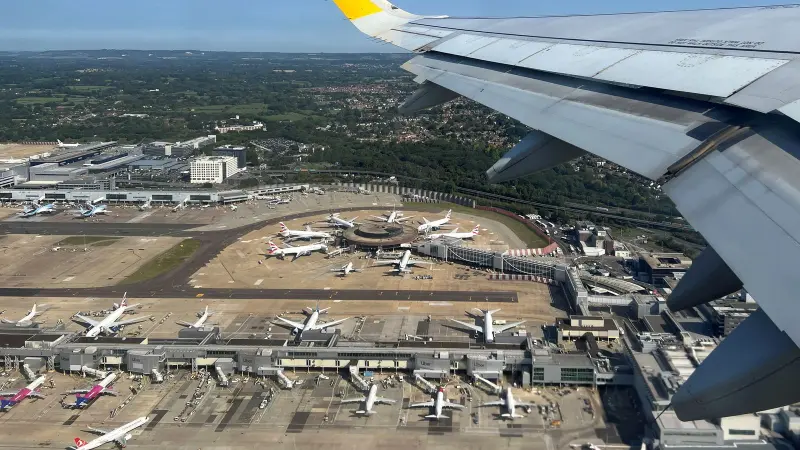September 23, 2025
The UK government has approved Gatwick Airport’s second runway to boost jobs and cut holiday costs, despite growing environmental concerns.

The UK government has given the official green light for Gatwick Airport’s long-anticipated second runway, a move that is already being hailed as one of the most transformative infrastructure decisions of the decade. Chancellor Rachel Reeves confirmed the approval yesterday, emphasizing that the new runway will serve as a catalyst for economic growth, create thousands of jobs, and reduce travel costs for holidaymakers.
The decision comes after years of debate surrounding the expansion of London’s second-busiest airport. Supporters argue that a second runway is essential to keep the UK competitive as an international hub for trade and tourism. By increasing capacity, Gatwick is expected to handle millions of additional passengers annually, reduce bottlenecks in the aviation system, and provide greater competition to Heathrow Airport. The Chancellor underscored that affordable travel was at the heart of the project, suggesting that increased competition will bring down the price of flights for families and boost consumer choice.
Industry analysts believe the expansion will also provide a significant boost to the regional economy. The construction and operational phases of the runway are projected to generate tens of thousands of jobs across sectors such as engineering, construction, hospitality, and aviation services. Local businesses in Sussex and the broader South East region anticipate a surge in demand as workers, tourists, and investors flow into the area. The government has framed the move as part of a wider strategy to modernize Britain’s infrastructure and stimulate growth in a post-Brexit economy that is still working to stabilize global trade links.
However, the announcement has been met with strong resistance from environmental groups, climate activists, and local residents. Critics argue that expanding airport capacity is fundamentally at odds with the UK’s legally binding climate commitments. Aviation is one of the fastest-growing sources of carbon emissions, and campaigners warn that an additional runway could lock the UK into decades of higher emissions. Organizations such as Greenpeace and Friends of the Earth have already signaled plans to challenge the project through protests and potential legal action.
Beyond climate concerns, local communities have raised alarms over noise pollution, traffic congestion, and air quality. Villages surrounding Gatwick fear an increase in daily flight operations will drastically affect quality of life. Environmental impact assessments commissioned by the government acknowledge potential challenges but stress that mitigation strategies, including noise barriers, compensation schemes, and investment in green technologies, will be part of the rollout.
The broader political landscape adds another layer of complexity. Successive governments have grappled with airport expansion plans, particularly between Heathrow and Gatwick. Heathrow’s controversial third runway has faced repeated delays due to environmental objections and legal battles. By contrast, Gatwick’s plan was positioned as a more pragmatic alternative that could be delivered faster, at lower cost, and with fewer disruptions. Reeves’s approval signals a shift in government policy, prioritizing Gatwick as the centerpiece of UK aviation expansion.
Internationally, the decision is seen as a bid to safeguard London’s global connectivity. With competing hubs like Amsterdam, Paris, and Dubai aggressively expanding their airport infrastructure, Gatwick’s second runway is viewed as essential for Britain to retain its status as a world aviation leader. Airlines, particularly low-cost carriers, are expected to benefit from expanded slots, allowing them to increase routes to emerging markets in Asia, the Middle East, and North America.
Still, the debate remains unresolved. While business leaders and trade groups welcome the runway as a much-needed shot in the arm for growth, climate scientists warn that the environmental price could outweigh economic gains. Balancing sustainability with competitiveness will be a defining challenge as construction moves forward.
The government has promised that Gatwick’s expansion will be delivered with “the highest environmental standards,” citing commitments to cleaner aviation fuels, investment in carbon offset projects, and integration with future green technologies. Yet many experts argue that such measures remain untested at the scale required. The runway approval therefore marks not only an infrastructure milestone but also a testing ground for the UK’s ability to reconcile growth with its climate pledges.
In the coming months, attention will turn to the timeline and funding for construction. Estimates suggest that building the second runway could take up to a decade and cost several billion pounds. Gatwick Airport Limited has pledged to finance much of the project through private investment, while the government has promised regulatory support. Whether the benefits of cheaper flights and job creation will outweigh the environmental and social costs remains one of the most pressing questions in UK public policy today.